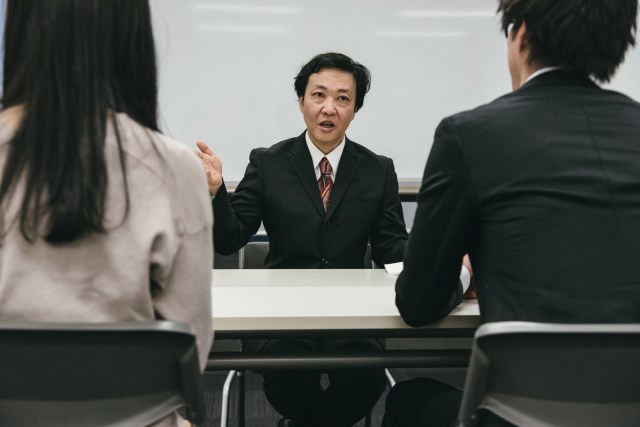
With jobs getting harder to find, it’s important that more people have the chance to be hired.
Japan has a number of unique business practices, but one of the most controversial, even within Japan, is the practice of reserving specific job openings for new college graduates. While this is a great idea in theory, as it increases the chances for students just coming out of college and entering the work force to get jobs, it disenfranchises many other workers because it limits who can apply for entry-level positions, since the “shinsotsu” or “new graduate” condition is limited to students who are just about to graduate (most university students do their job-hunting and secure positions before finishing their studies).
But the practice poses issues during the pandemic. In ordinary years, job-hunting students often attend in-person company recruiting seminars and preliminary group interviews, but those events have been severely disrupted due to compliance with social distancing recommendations. Coupled with businesses closing or offering fewer positions because of economic downturns, many young people have been left without job options.
That’s why three Japanese cabinet ministers met last week to discuss what can be done to help these students. Norihisa Tamura (Minister of Health, Labor and Welfare), Koichi Hagiuda (Minister of Education, Culture, Sports, Science and Technology), and Tetsushi Sakamoto (Minister for Promoting Dynamic Engagement of All Citizens), along with Akio Mimura (Chairman of the Japan Chamber of Commerce and Industry) all concluded that, with the increasing employment difficulties facing upcoming graduates, qualification for shinsotsu job openings should be extended to students who have graduated within the last three years, instead brand new graduates.
Though this isn’t a law-making policy and is only a strong suggestion on the part of the ministers, the members of the Japan Chamber of Commerce and Industry, which is the largest business association of small and medium business in Japan, were all in agreement with the idea, and the Federation of Economic Organizations also views the plan favorably, so it seems it will be adopted by many companies.
But while this idea is good in theory, in practice its effectiveness may be limited. Shinsotsu jobs are usually given to students who go through a grueling and stressful job hunting process that starts in their third year of college. By the end of their third year, they would hopefully have received an informal offer of employment from a company, with a formal offer arriving in the middle of their final year.
In other words, when companies recruit for shinsotsu positions, they’re really interviewing upcoming graduates. So if companies follow the ministers’ recommendation and extend their definition of shinsotsu to a three-year window, will they apply that only to students who will be graduating at the end of the current academic year in spring 2021 and are applying for jobs from 2021 to 2024, or will that same three-year courtesy be retroactively granted to students who graduated in 2018-2020 and want to apply for a shinsotsu position in 2021? And if the extension is applied to 2018-2020 graduates, would they have voided their shinsotsu eligibility if they took some other job to make ends meet in the meanwhile, a job they might have lost during the economic downturn?
Hopefully the ministers are working to help more than just the class of 2021, because too many people are struggling to keep afloat in the middle of this pandemic and its resulting recession.
Source: Jiji.com via Otacom, NHK News Web
Top image: Pakutaso
Insert image: Pakutaso
● Want to hear about SoraNews24’s latest articles as soon as they’re published? Follow us on Facebook and Twitter!


 “Be a blank slate”: The way to get hired in Japan?
“Be a blank slate”: The way to get hired in Japan? Foreigners in Japan sound off on the top four quirks of the Japanese job-hunting system
Foreigners in Japan sound off on the top four quirks of the Japanese job-hunting system Japanese clothing chain offers an answer to job-hunting suit conundrum
Japanese clothing chain offers an answer to job-hunting suit conundrum Why aren’t there more female entrepreneurs in Japan? Pull up a chair… 【Women in Japan Series】
Why aren’t there more female entrepreneurs in Japan? Pull up a chair… 【Women in Japan Series】 Pantene ad asks why people in Japan are forced to look the same when job hunting
Pantene ad asks why people in Japan are forced to look the same when job hunting Foreigner’s request for help in Tokyo makes us sad for the state of society
Foreigner’s request for help in Tokyo makes us sad for the state of society Japanese city loses residents’ personal data, which was on paper being transported on a windy day
Japanese city loses residents’ personal data, which was on paper being transported on a windy day Seaside scenery, history, and so many desserts on Yokohama’s Akai Kutsu【Japan Loop Buses】
Seaside scenery, history, and so many desserts on Yokohama’s Akai Kutsu【Japan Loop Buses】 Ghibli Park now selling “Grilled Frogs” from food cart in Valley of Witches
Ghibli Park now selling “Grilled Frogs” from food cart in Valley of Witches Historical figures get manga makeovers from artists of Spy x Family, My Hero Academia and more
Historical figures get manga makeovers from artists of Spy x Family, My Hero Academia and more Suntory x Super Mario collaboration creates a clever way to transform into Mario【Videos】
Suntory x Super Mario collaboration creates a clever way to transform into Mario【Videos】 Akihabara pop-up shop sells goods made by Japanese prison inmates
Akihabara pop-up shop sells goods made by Japanese prison inmates Japan’s massive matcha parfait weighs 6 kilos, contains hidden surprises for anyone who eats it
Japan’s massive matcha parfait weighs 6 kilos, contains hidden surprises for anyone who eats it New adorable, two-color Vulpix airplane will take you to Hokkaido, not even for a limited time
New adorable, two-color Vulpix airplane will take you to Hokkaido, not even for a limited time Japan removes tour guide requirement for foreign tourists
Japan removes tour guide requirement for foreign tourists McDonald’s new Happy Meals offer up cute and practical Sanrio lifestyle goods
McDonald’s new Happy Meals offer up cute and practical Sanrio lifestyle goods Japanese ramen restaurants under pressure from new yen banknotes
Japanese ramen restaurants under pressure from new yen banknotes French Fries Bread in Tokyo’s Shibuya becomes a hit on social media
French Fries Bread in Tokyo’s Shibuya becomes a hit on social media Studio Ghibli releases new action figures featuring Nausicaä of the Valley of the Wind characters
Studio Ghibli releases new action figures featuring Nausicaä of the Valley of the Wind characters New private rooms on Tokaido Shinkansen change the way we travel from Tokyo to Kyoto
New private rooms on Tokaido Shinkansen change the way we travel from Tokyo to Kyoto Red light district sushi restaurant in Tokyo shows us just how wrong we were about it
Red light district sushi restaurant in Tokyo shows us just how wrong we were about it Tokyo Tsukiji fish market site to be redeveloped with 50,000-seat stadium, hotel, shopping center
Tokyo Tsukiji fish market site to be redeveloped with 50,000-seat stadium, hotel, shopping center All-you-can-drink Starbucks and amazing views part of Tokyo’s new 170 meter-high sky lounge
All-you-can-drink Starbucks and amazing views part of Tokyo’s new 170 meter-high sky lounge Beautiful Ghibli sealing wax kits let you create accessories and elegant letter decorations【Pics】
Beautiful Ghibli sealing wax kits let you create accessories and elegant letter decorations【Pics】 Studio Ghibli releases Kiki’s Delivery Service chocolate cake pouches in Japan
Studio Ghibli releases Kiki’s Delivery Service chocolate cake pouches in Japan New definition of “Japanese whiskey” goes into effect to prevent fakes from fooling overseas buyers
New definition of “Japanese whiskey” goes into effect to prevent fakes from fooling overseas buyers Our Japanese reporter visits Costco in the U.S., finds super American and very Japanese things
Our Japanese reporter visits Costco in the U.S., finds super American and very Japanese things Studio Ghibli unveils Mother’s Day gift set that captures the love in My Neighbour Totoro
Studio Ghibli unveils Mother’s Day gift set that captures the love in My Neighbour Totoro More foreign tourists than ever before in history visited Japan last month
More foreign tourists than ever before in history visited Japan last month New Pokémon cakes let you eat your way through Pikachu and all the Eevee evolutions
New Pokémon cakes let you eat your way through Pikachu and all the Eevee evolutions Sales of Japan’s most convenient train ticket/shopping payment cards suspended indefinitely
Sales of Japan’s most convenient train ticket/shopping payment cards suspended indefinitely Sold-out Studio Ghibli desktop humidifiers are back so Totoro can help you through the dry season
Sold-out Studio Ghibli desktop humidifiers are back so Totoro can help you through the dry season Japanese government to make first change to romanization spelling rules since the 1950s
Japanese government to make first change to romanization spelling rules since the 1950s Ghibli founders Toshio Suzuki and Hayao Miyazaki contribute to Japanese whisky Totoro label design
Ghibli founders Toshio Suzuki and Hayao Miyazaki contribute to Japanese whisky Totoro label design Doraemon found buried at sea as scene from 1993 anime becomes real life【Photos】
Doraemon found buried at sea as scene from 1993 anime becomes real life【Photos】 Tokyo’s most famous Starbucks is closed
Tokyo’s most famous Starbucks is closed One Piece characters’ nationalities revealed, but fans have mixed opinions
One Piece characters’ nationalities revealed, but fans have mixed opinions We asked a Uniqlo employee what four things we should buy and their suggestions didn’t disappoint
We asked a Uniqlo employee what four things we should buy and their suggestions didn’t disappoint Princesses, fruits, and blacksmiths: Study reveals the 30 most unusual family names in Japan
Princesses, fruits, and blacksmiths: Study reveals the 30 most unusual family names in Japan Study reveals staff shortage in Japanese firms, suggests a need to accept low-skilled foreigners
Study reveals staff shortage in Japanese firms, suggests a need to accept low-skilled foreigners “Face Hiring”: Japanese cosmetics company Isehan’s new hiring campaign is causing a stir
“Face Hiring”: Japanese cosmetics company Isehan’s new hiring campaign is causing a stir Japanese university globalizes with fall start date, governor wants English as official language
Japanese university globalizes with fall start date, governor wants English as official language Four frustrating attitudes women in Japan run into when interviewing for jobs, grouped by age
Four frustrating attitudes women in Japan run into when interviewing for jobs, grouped by age Japanese politicians want to make it easier for foreigners to get anime assistant work visas
Japanese politicians want to make it easier for foreigners to get anime assistant work visas Can you handle the heat? Japan’s one and only Curry College now enrolling new students
Can you handle the heat? Japan’s one and only Curry College now enrolling new students New employee late to work in Japan shocks older coworkers by blaming the screw-up on “Mama”
New employee late to work in Japan shocks older coworkers by blaming the screw-up on “Mama” Soba restaurant in Japan struggles to find new employee, rewords job ad and offers flood in
Soba restaurant in Japan struggles to find new employee, rewords job ad and offers flood in The number of doctorate students in Japan is now almost half of what it was 17 years ago
The number of doctorate students in Japan is now almost half of what it was 17 years ago It’s all about the money: The best (and worst) paid student jobs in Japan
It’s all about the money: The best (and worst) paid student jobs in Japan Tokyo University of the Arts to offer graduate program in video game design next year
Tokyo University of the Arts to offer graduate program in video game design next year All-boys’ high school in Japan has mandatory grooming lesson, teaches about skincare, hairstyling
All-boys’ high school in Japan has mandatory grooming lesson, teaches about skincare, hairstyling Sake brand Dassai increases workers’ starting pay by over 40 percent, pledges to double salaries
Sake brand Dassai increases workers’ starting pay by over 40 percent, pledges to double salaries Mad Max’s Doof Wagon crashes college graduation in Tokyo 【Video】
Mad Max’s Doof Wagon crashes college graduation in Tokyo 【Video】 Which jobs in Japan have the most and least overtime? Survey investigates
Which jobs in Japan have the most and least overtime? Survey investigates
Leave a Reply